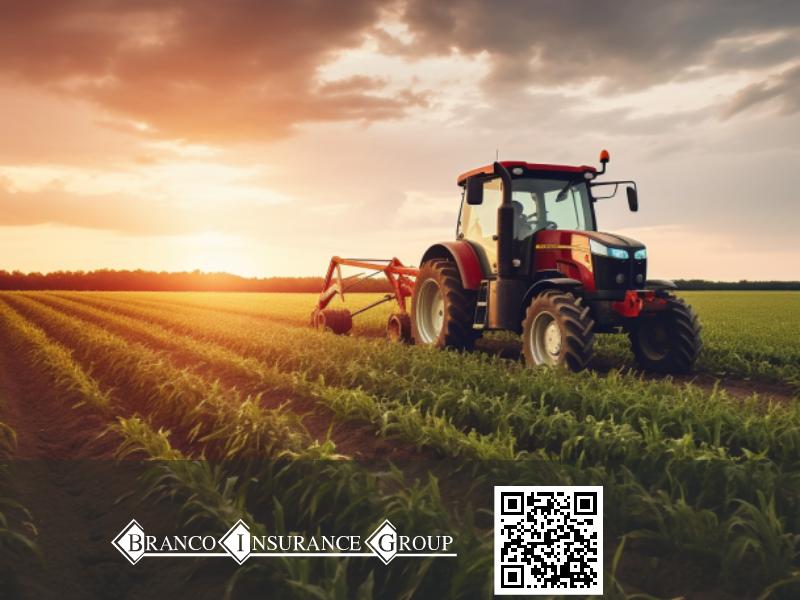
Tips to Prevent Medicare Fraud
Con artists may try to get your Medicare Number or personal information so they can steal your identity and commit Medicare fraud. Medicare fraud results

The world of agriculture is often unpredictable, with farmers and ranchers facing a myriad of risks that could damage their business – from natural disasters to disease.
That’s where agriculture insurance comes in, offering protection against potential losses and providing financial security for those who work tirelessly to feed the nation.
In this blog post, we’ll dive into the essentials of agriculture insurance, exploring its types, benefits, and how it serves as an invaluable risk management tool for agricultural producers across the United States.
Agriculture insurance is a risk management tool that provides protection against unexpected events and financial security for farmers, with various types of coverage available depending on eligibility and qualification requirements.
Agriculture insurance is a specialized form of coverage designed to protect farmers and agricultural producers from the various unique risks they face in their day-to-day operations.
The purpose of this insurance is to provide financial security against unexpected events, such as adverse weather conditions, pests, diseases, or even market fluctuations that could negatively impact crop yields and revenue.
For example, imagine an unpredictable hailstorm devastates your apple orchard just weeks before harvest time; without suitable agriculture insurance in place, you would be left bearing the brunt of financial losses from damaged crops.
On the other hand, with proper coverage tailored to your specific needs as a producer – such as federal crop insurance programs offered by the United States Department of Agriculture (USDA) – you can safeguard your income stream and continue investing in improvements on your farm.
In the world of agriculture insurance, there is a diverse range of coverage options designed to protect farmers and agribusinesses from various risks. Here are some common types of coverage available for those seeking agriculture insurance:
By understanding the unique risks associated with your agriculture business and choosing the appropriate coverage types, you can ensure your farm’s continued success through unpredictable challenges and unexpected setbacks.
Navigating the eligibility and qualification requirements for agriculture insurance is a vital step for farmers and ranchers interested in safeguarding their livelihoods.
To be considered eligible, an individual must actively operate as an agricultural farmer or rancher and adhere to conservation compliance standards.
In addition, the Federal Crop Insurance Program (FCIP) offers coverage plans for more than 100 different crops or commodities across a broad range of unique risks that may vary by geographic location, climate conditions, and farm size.
Keep in mind that the guidelines for crop insurance change frequently; staying updated on these changes is crucial to maintain your status as an insured producer. For example, suppose you’re a farmer growing corn in Iowa battling unpredictable weather patterns like hailstorms or drought events – it’s essential to explore various crop insurance plans designed specifically with those potential risks in mind.
Agriculture insurance offers a broad range of benefits to farmers and ranchers, including protection against unexpected events, financial security, increased confidence, and peace of mind.
Agriculture insurance offers protection against a wide range of unexpected events that can devastate farming operations, including droughts, floods, wildfires, and more. Such events have the potential to cause significant damage to crops or livestock and negatively impact agricultural income.
Having adequate coverage ensures farmers can recover from these losses and continue production without incurring financial ruin. For example, the federal crop insurance program administered by the USDA’s Risk Management Agency provides multi-peril crop insurance that covers losses due to adverse weather conditions like hailstorms or lightning strikes on insured crops.
One of the biggest benefits of agriculture insurance is the financial security it provides for farmers. With coverage options that protect against unexpected events like droughts, hailstorms, and other disasters, farmers can have peace of mind knowing they won’t be left with a significant financial burden if something goes wrong.
Additionally, indemnity payments from insurance policies can help improve farm liquidity by offsetting losses and reducing credit constraints.
In recent years, the USDA has also expanded its suite of disaster assistance programs and other coverage options to provide additional support for farmers facing unique risks and challenges across the country.
One of the critical benefits of agriculture insurance is that it provides farmers with increased confidence and peace of mind. Insurance coverage can significantly reduce volatility, allowing farmers to protect their assets against unexpected events such as natural disasters, pests, or financial losses due to market fluctuations.
For example, imagine a farmer who invests significant amounts of time and money into planting crops each season only for drought to hit unexpectedly. Agricultural insurance allows farmers to recover from those losses quickly and efficiently so they can continue operating their farms without facing any significant financial setbacks or having to take on debt to stay open for business.
When selecting agriculture insurance, it is crucial to consider factors such as the type of crops or livestock, geographic location and climate, farm size and operation, as well coverage limits and deductibles.
Choosing the right type of crop or livestock to cover with your agriculture insurance is an important decision. Different policies may be better suited for different types of crops or livestock, depending on their risk exposure and market value.
For example, some crops are more susceptible to weather-related risks such as drought or hail damage, while others may be more vulnerable to disease or pest outbreaks.
It’s essential to research and compare the various policy options available for your specific agricultural products carefully. Some policies offer more comprehensive coverage than others and come with higher premiums or deductibles.
The geographic location and climate of an agricultural operation are important factors that must be considered when selecting a crop insurance policy. For instance, rain-fed agriculture is more vulnerable to risks and exposure to natural disasters such as droughts or floods, making it necessary for farmers to obtain adequate insurance coverage.
For example, farms located in areas prone to hail or other weather-related perils should consider purchasing policies that cover these specific risks. It’s worth noting that adverse weather patterns caused by climate change can also pose significant challenges for agricultural producers.
Farm size and operation are important factors to consider when choosing agriculture insurance. The amount of coverage needed will depend on the size and type of farming operation, as well as the level of risk involved.
Additionally, the type of crops or livestock produced can also impact insurance needs. For example, certain types of crops may be more susceptible to natural disasters such as droughts or hail storms.
Overall, agriculture insurance helps farmers manage the inherent risks associated with operating a farm or ranch by providing financial security in case of unexpected events.
Having a good understanding of coverage limits and deductibles is crucial when selecting agriculture insurance. Coverage limits refer to the maximum amount an insurer will pay out in case of loss or damage, while deductibles are the amount that farmers need to pay before their coverage kicks in.
For instance, if you choose low coverage limits and high deductibles, it could save you money on premiums but leave you vulnerable to substantial losses in case of disasters like hailstorms or droughts.
On the other hand, high coverage limits with low deductibles might provide more comprehensive protection but also lead to higher premium costs.
It’s also worth noting that some federal crop insurance programs come with different levels of coverage and deductible options depending on what types of crops you grow and where your farm is located.
To obtain agriculture insurance, farmers and ranchers should research and compare policies, consult with an agent or broker, complete necessary paperwork and documentation, maintain accurate records, and regularly review and update coverage.
Before obtaining agriculture insurance, it’s essential to research and compare policies. Different companies offer various coverage options with different deductibles and premiums.
Take into account the type of crops or livestock you have, your geographical location, farm size, and operation before choosing an insurance policy. Always read the policy carefully to understand its terms and conditions fully.
According to recent studies, agricultural insurance penetration among smallholder farmers globally remains low despite a growing need for effective agricultural insurance policies that can stabilize income and reduce poverty rates for farmers.
In America alone, the federal crop insurance program is the primary individual crop insurance available today; It provides broad coverage against natural disasters such as droughts or hailstorms while improving the industry by managing risks for farmers’ crops effectively.
It’s always a good idea to consult with an insurance agent or broker when looking for agriculture insurance. These professionals have extensive knowledge of the industry and can help you find the right policy that suits your needs.
An agent or broker will work closely with you to understand your unique risks as an agricultural producer and ensure that you have adequate protection against unexpected events such as natural disasters or crop failure.
Additionally, they can help explain various policies available under the federal crop insurance program which provides a broad range of solutions for farmers across America.
To obtain agriculture insurance, it is important to prepare and submit the necessary paperwork and documentation. This may include information about your farm size, crop or livestock types, and location.
For example, essential documents such as vehicle titles and insurance are required when buying, selling, or leasing agricultural property. The United States Department of Agriculture (USDA) also offers financial relief programs such as loan guarantees and interest subsidies that may require additional paperwork.
Maintaining accurate records is a crucial part of obtaining and managing agriculture insurance. Whether it’s for crops, livestock, or any other type of coverage, farmers are required to keep detailed records that track production and financial information.
By keeping well-maintained and organized records, farmers can provide proof of their losses in case things go wrong.
Accurate record-keeping involves collecting data on crop yields, expenses incurred during farming operations, weather patterns, soil conditions, and more. This information helps insurers to better assess risks associated with different types of crops, livestock, or farming practices.
It is crucial for farmers to regularly review and update their agriculture insurance coverage to ensure they are adequately protected against potential risks. Farming conditions can change rapidly due to unpredictable weather patterns, crop diseases, market fluctuations, or even new farming practices.
Therefore, reviewing policies at least once a year can help identify any gaps in the coverage and adjust it accordingly.
Furthermore, updating insurance policies can also increase savings on premiums by adjusting deductibles or exploring different types of coverages that better suit specific needs.
Staying updated with regulations and recent advancements in agriculture insurance products can ensure that farmers take advantage of opportunities for improvements in risk management solutions while preserving their investment in their farms.
Agriculture insurance plays a critical role in ensuring that farmers and ranchers remain financially stable amidst unexpected events. With its broad range of coverage options, agriculture insurance provides protection against natural disasters, property damage, crop losses, and more.
By working with dedicated agents and maintaining accurate records, agricultural producers can ensure that their farms are protected from all types of risks. If you have any other questions about agricultural insurance or if you are ready to get a quote, contact Branco Insurance Group today!
We are here to help you find the right coverage for your farm and to make sure that you are taking advantage of all the opportunities available to manage risks and protect your investment. Thank you for considering Branco Insurance Group. Let us help you feel more secure in the future of your agricultural operations.
Agriculture insurance is a type of coverage that protects farmers and ranchers against financial losses due to unexpected events like natural disasters, crop failures, or livestock deaths. It covers a wide range of potential risks, including weather-related damage, pest infestations, market fluctuations, equipment breakdowns, and more.
No, agriculture insurance is not mandatory by law, but many farmers choose to purchase this type of coverage in order to protect their businesses from unpredictable events that could result in significant financial loss.
The best way to determine which policy meets your needs is by speaking with an experienced agent who specializes in agricultural coverage. They will be able to assess the specific risks associated with your operation and provide tailored recommendations accordingly.
Yes, there are several government-sponsored programs specifically designed for farmers, including the Federal Crop Insurance program (FCIP) which provides subsidies for various types of crop-specific policies offered through private insurers as well as risk management options like disaster assistance loans, crop indemnity payments & conservation grants among other things . However, eligibility requirements vary depending on each program, so it’s important to research them all thoroughly before making any decisions.

Con artists may try to get your Medicare Number or personal information so they can steal your identity and commit Medicare fraud. Medicare fraud results

Summer is a fun time for humans and pets, but the rising temperatures can pose risks to our furry friends. Here are some essential tips
